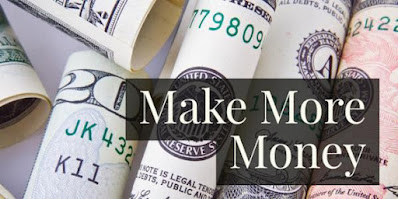We gathered interesting opinions on “how to get rich” and as always are sharing them with you below:
Bringing in a steady income is important but when it comes to being a millionaire, bringing in multiple streams of income is even more important. Take on an extra part-time job to bring in a little extra. Side jobs such as grass cutting, car washing and even selling on eBay are additional ways to make money. With the way, the job market can sometimes dip it helps to have a backup plan. This is especially important if your full-time income is not enough to cover all your monthly expenses.
Save 10% of your after-tax income. And remember that there is always someone, somewhere making 10% less than you and they are doing just fine.
Put an advertisement in newspapers and magazines:
“EARN EA$Y MONEY FA$T!! Send $10 to PO Box … to learn how”
Then send them a letter telling them to put an ad in a newspaper or magazine with the above.
The quickest way to get rich is to not spend any of your money, and then you’ll have more than you need. If you save enough money, you might end up with the means to quit your day job and launch your own venture. That means flying coach even if you can afford first class.
Befriend some elderly rich people. Then leverage your relationship.
Get-rich-quick thinking leads to three basic errors:
1. Getting involved with things you cannot understand
2. Risking funds you cannot afford to lose, that is, borrowed funds
3. Making hasty decisions
Each of these actions violates one or more biblical principles... Together they constitute a sin called ‘greed’.
Never become content with your position in anything. Never stop pursuing your dreams and capitalizing on them.
Found a religion and ask for significant donations for your ministries. This has never failed and has made several, otherwise unemployable people, quite rich.
Having a good credit score will help you scale your business and obtain loans, financing, and further lines of credit for big purchases. On the other hand, having a poor credit score will plague you with high interest rates. Many business owners are unaware that they should be establishing credit for their companies in addition to personal credit. A few actions you can take to boost your credit score include paying your bills on time, minimizing your debt, and checking your credit report periodically.
Take whatever you want and give nothing back! (Capt. Jack Sparrow)
Rob some banks :) – like Willie Sutton. When he was asked why he robs banks, he replied slowly: “Because that's where the money is… stupid”
Rule #1 - Don't lose money. Rule #2 – Don’t forget rule #1. (Warren Buffet)
There must be a market for the product or service you’re providing. Make sure you’re providing something customers need. And, If someone else out there is already doing what you seek to do, find a way to differentiate yourself and improve upon it.
Don't invest without a stop loss. if price goes up, reset stop loss to 3-5% of low of the last 2 weeks... because, the trend is your friend, until it ends.
If you wake up before anyone else who might distract you from work, exercise, and daily organization, you’ll be further ahead -- literally. Studies have shown that the most successful among us are early risers. For one, they’re proactive problem-solvers. Magazines have gathered plenty of anecdotal evidence for this lifestyle hack over the years.
Parade the streets in suggestive clothing and, when approached, offer favors in exchange for cash :). Or smack.
Marry a well to do heiress… or her daughter :)
To set yourself up for success, start a company in an area you’re passionate about. Entrepreneurship takes hard work, and you’ll be far less likely to put in that work over the long haul if your heart isn’t in what you’re doing. If you pick an industry because you think it will be a lucrative one, there’s going to be somebody who’s going to know that business better than you do and is going to kick your ass. (Mark Cuban)
Work , find a good and compatible companion, study, save, invest, and stay healthy - simple, isn't it? Repeat for 50 years and you'll be fine.
While homeownership is a dream for many people, the entrepreneurial lifestyle is becoming increasingly remote and transient. Rather than waiting to pay off your home, it might be wise to put your monthly payments toward rent and consider other types of investments.
1. Pay off all your credit cards.
2. Max out your 401K/IRA contributions.
3. Diversify your investments
4. Rinse and repeat for 20 years.
You have talents, experiences, and passions to share with the world. You can make a living if you’re willing to offer your time and skills to help improve the lives of others -- or teach others how you do what you do to be successful.
The quickest way to lump sum earning, is through forex trading. Today forex is the biggest market on the earth with a daily turnover of trillion dollars.
Keep your mouth shut – because silence is golden :)
Small profits add up to big success. Consider investing: You don’t need a lot to get started, and you shouldn’t expect massive returns right away. With patience, you can turn a little bit into a large sum.
People will remember you if you make yourself known for something, or if your product or service is always available at a regular interval. This tactic particularly pays off for entrepreneurs who use social media. Consider people who have made millions as Instagram influencers by being on message when their audiences expected them to be. (Casey Neistat)
How are you going to reach your goal of being rich? What goals will you have to meet along the way? Sit down and physically compose a plan, complete with priorities, timelines, retirement plan contributions -- whatever is applicable to you and your situation.
In recent years, we've become enamored with our own past success. Lulled into complacency by the glitter of our own achievements. We've become accustomed to the title of Military Superpower, forgetting the qualities that got us there. We've become accustomed to our economic dominance in the world, forgetting that it wasn't reckless deals and get rich quick schemes that got us where we are, but hard work and smart ideas, quality products and wise investments. (Barack Obama)
The mind is a powerful thing, especially when it comes to your money mindset. If you have a poor mindset, you will continue making poor financial decisions keeping you living paycheck to paycheck. You can change from a poor mindset to a rich mindset by developing the right habits. A popular way to get motivated and create a rich mindset is to create a financial vision board. You will put up pictures, motivational quotes, and financial goals on your board and hang it where you see it every day. This helps you to see your financial goals daily and can keep you motivated.
Getting on a budget is essential when it comes to getting rich. Budgeting holds you accountable for all the money you spend. When making a budget, you want to find a budgeting method that works best for you and stick to it. You may be surprised that many millionaires stick with a budget to stay financially successful.
You can boost your current income to help in your new financial journey of getting rich. One way to do this is by asking for a raise at your current job. Be sure you have been performing well and have worked for the company for a while if you go this route. If you are a good employee, they may be willing to increase your income to keep you from looking for another job.
Rich people invest time, energy, and money in improving themselves. A man told me once, “The best way you can help people in need is to not be someone in need.” Help yourself out so you are in a position to help someone else out. This means investing in yourself to become great at something.
Commit to being great, not just average. Any industry can be a painful profession for average and bottom performers, but massively rewarding for those that are great. Those that live, breathe, and eat their profession, those that are obsessed, become great.
You want what are called symbiotic flows. Do not just add disconnected flows. Instead, find other ways you can add income to the job you already have. For example – a friend of mine, doing videos does advertising for me — and after proving himself, he started making advertisements for those connected to me. He didn't start a doughnut shop.
First, try to save $100,000. You need to prove to yourself that you can go out and get money. If you only have $10,000 saved, your only priority should be increasing your income so that you can save more. Saving $100,000 shows that you have an ability to make money and then to keep it. Most people can't do either of those things.
Learn the game of money:
- How to read profit and loss statements and other financial forms
- The rules of Tax
- The difference between assets and liabilities
- How to improve your credit
- The difference between good debt and bad debt
Find a rich mentor. Someone who understands what you’re going through. They will understand your ambition, and they can inspire you. They can also help you develop a wealth plan and help you stick to it.
Network with important people. Decide on your area of business and then network with all the players. This will drive business and opportunities to your company.
Track spending, audit expenses and use discounts and promotions on every one of your purchase.
Get rich by surrounding yourself with rich people. Be a loyal friend – offer your help, listen to them, and learn from their experience on how to get rich.







